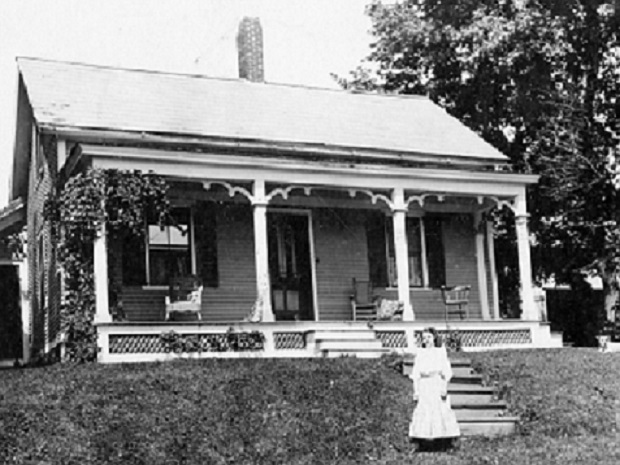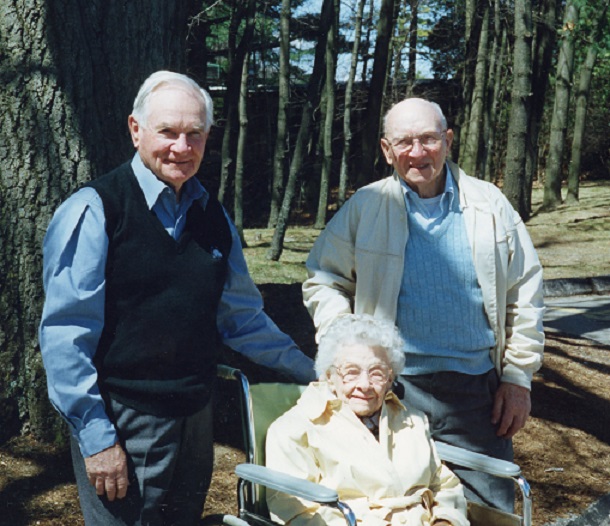Chapter Nineteen
CORNELIA
Mom, Oldest Person in Vermont, One of Twelve,
"Today I Must Bake"

Cornelia at age 12
Cornelia Antoinette Goulette Poulin was our mother. I've sometimes felt that the choice of given names from royalty and antiquity was very appropriate. Not that she would ever have claim to fame or fortune but because she possessed qualities of will, strength and confidence that made the three-syllable names seem very suitable. She was in no way run-of-the-mill.
Brother Richard and I were with her during her last days at the nursing home in Burlington when she directed, piece by piece, the disposition of her personal and precious items of jewelry to relations and friends. She was very rational and in good humor. The next morning, clutching her rosary, she quietly passed on as we sat by her bedside. It was December 9, 1999.
She was 106 years old and widely known and publicized in Vermont for she had been its oldest living resident for several years, and being mobile and articulate, she was recognized by many. She was a devout Catholic and a favorite of local churchmen who included her in church activities. In the last year of her life she was visited at the nursing home by the Bishop of the Burlington diocese who offered Mass there for her and presented her with a rosary.
Cornelia (Connie to many and Kinnie to some) was born in Cornwall, Vermont, in 1893 to parents Edward and Lena Goulette. She was the first child of twelve and at age nineteen would help deliver her youngest sister when her mother was unattended.
In 1902 during her third year of school she was selected from among several area schools to be the student presenting a bouquet of flowers to then-President Teddy Roosevelt on the occasion of his visit to the Vermont Governor's mansion in Proctor. In her one hundredth year she could recall and describe the occasion vividly.
She was an enthusiastic student but, despite the personal intervention of the school superintendent, was required to leave school after completing the eighth grade to help her mother feed and care for the succession of babies. While another might have been resentful of giving up school and teen years to care for a brood of younger brothers and sisters, she was devoted to them and concerned about their Catholic training. At age 16 she took her youngest unbaptized siblings in the buggy to St. Mary's Church in Middlebury and saw that they received the sacrament.
As a small boy I can remember her younger siblings coming to the farm, sometimes several at a time. She would always be their second mother, offering advice and help, chiding when appropriate and taking measures to get them out of trouble.
Cornelia married my father when he was twenty-two and she was twenty-one. At that time she was four feet eleven inches tall and weighed about one hundred pounds. Her size was in no way reflective of the figurative load she had carried and would welcome during the remainder of her productive life.
In later years Mom would say, "My happiest days were when my boys were little on the farm." I know those words were spoken from the heart, but recalling the demands of domesticity on this wee woman, who fed and clothed a household of men without help, electricity or running water, there must have been moments when she would have expressed it differently.
Mom's workday never stopped. Even at night, as we sat around the kitchen table doing our school work, she would be busy with her sewing basket. Discussing her many tasks would be far too time consuming so I'll merely list them:
Garden and Canning: beets, carrots, onions, potatoes, string beans, applesauce, pickles, corn, peas, pork, beef, bourdain, weeding, flowers
Other Foods: churn butter, make cottage cheese, ice cream, bake bread, cakes, pies, meats
Household: sew, patch, cook, clean, wash, iron, dishes
Family: nurse, heal, entertain, hostess, driver, arbitrator, assistant pastor
Each of the above could be described in detail, including the inconveniences of the time and place in which they occurred, but they were some of the tasks my mother willingly performed in the nearly 20 years she lived on the farm.
I recall a winter night when we three boys sat around the kitchen table doing our schoolwork by the light of a kerosene lamp. Mom and Dad shared another lamp while he read the Middlebury Register for local news and she kept busy with her sewing basket. She would have prepared some hot cocoa and cookies or cake for us boys to eat while we studied.
The kitchen in winter was the primary living area, warmed as it was by the big kitchen stove. The open front grate glowed and sometimes emitted crackles and hisses as wet spots in the firewood were heated. Occasionally sparks or even embers burst out from a minor explosion and we boys would scurry with a coal scoop to capture them before other holes were burned in the already scarred linoleum.
Eventually when the woodbox was low she'd say, "I need a boy to go to the woodshed and get some more wood for the stove." When none of us would make the first move she would wait for our discomfort and then say, "Well, never mind. I'll do it myself." Then we would scamper.
There was a social life and there were fun times. She was an excellent cook and enjoyed having company. There were card parties at home and at the village. There were silent movies in Middlebury and Bristol, live shows and special events such as ballgames and county fairs. She was fun-loving and often played with the boys.
The Depression and the failure of the farm brought that phase to an end.
Looking for a way to generate some cash, she entered a contest to sell subscriptions to the Middlebury Register newspaper. It involved driving the Model T Ford around the secondary roads of Addison County, going from house to house in the worst kinds of weather to convince householders that they needed the local paper. She was successful and won the top prize. I don't recall the amount, but it seemed an enormous sum to us.
When we were in our last years of high school, she went to work for the family of a professor at Middlebury College and came home on Sunday to do our laundry and cook and bake in sufficient quantities to last the week.
Eventually, in 1935, we left the farm. Dad began a cooking apprenticeship at the Middlebury Inn and she worked as a domestic in the homes of physicians in Burlington. I finished my last school year with Aunt Josie (Dad's sister) on Town Hill, Richard worked for a neighbor, Robert Sherman, and Edward was already at the University of Vermont on a scholarship.
We would not be a family in residence again for several years.
"Cor-neel-ya" was a valued employee who expected certain standards from her employers' families. When the kids used bad language, they were straightened out. The master of the household learned not to take liberties with this sprightly little French woman. She did not withhold advice, but was always retained because she became part of the household and dear to the children. Years later the grown children would come by the house on Grant Street to see her.
Eventually Dad found work in Burlington and they made a home there from which I attended the University of Vermont. She and Dad had worked in hotels and restaurants in New York State and Florida in their respective roles of Chef and Pastry Cook. Eventually they returned home to Burlington to work at the Black Cat Cafe in their same areas of expertise.
That is where my wife and family visited them most often and where Grandma delighted in the five small grandchildren.
Dad succumbed to cancer in 1962 at the age of seventy. Mom stayed on at their home and extended her benevolent tendencies to taking care of individual babies and young children, some of whom were underprivileged or handicapped in some way. Over time she had taken care of 52 of them.
At 78 years of age, Mom moved into an apartment at the Independent Living Facility on St. Paul Street. Needless to say it had a kitchen, for she would continue her life-long way of checking out the neighbor's needs and cooking treats for them as a way of keeping occupied.
I had given her a small tape recorder and asked her to try making a life history, but she was not comfortable with it and volunteered to keep a little journal in which she would record her memories. In her final days on St. Paul Street, she wrote a short paragraph that to me wonderfully exemplifies her life of commitment to others:
"My many friends are gone now, so at times I feel lonely. But today I must bake banana bread and cookies with nuts and coconut for Peggy, and while at it make sugar cookies for Bud and Donald. Have to make cake and banana bread for the bazaar here this week also."
She was buried with Dad at the Catholic Cemetery (Resurrection Park) in South Burlington.
Of the twelve siblings Mom helped raise, only one remains: Madelaine Mulroy of Fair Haven, Vermont. Maddie is a sweet, joyful lady who lives in a retirement home and who sat with me at Mom's funeral. She loves spiffy hats and she used to dance the Charleston with flair.

Paul and Richard with their mother Cornelia (104) around 1997